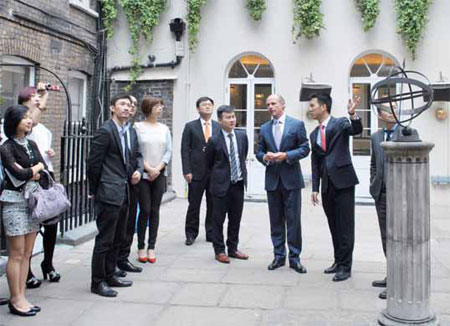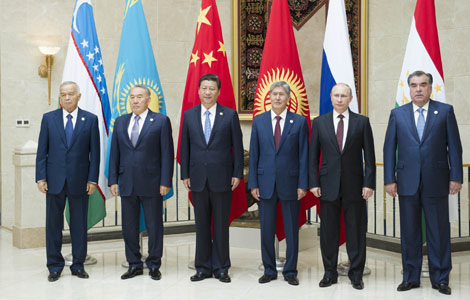Succession proves a tricky art in business
Updated: 2013-09-16 08:15
By Zhang Chunyan and Qiu Bo in London (China Daily)
|
||||||||
|
Young Chinese entrepreneurs who traveled to Britain recently on a tour conducted by Fleming Family & Partners of London. Provided to China Daily |
Rich second generation taught how to keep the family wealth
Whether they were born with silver chopsticks in their mouths is moot, but we can be sure that they have led very comfortable lives, received the best education and wanted for nothing materially.
These are the children of the first batch of China's private entrepreneurs who have grown immensely rich since reform and opening-up began in the late 1970s. As these business people have approached, reached and passed retiring age, their children, many born in the 1980s, have been groomed to take over the family concern.
Because private businesses did not exist in China during the planned-economy era, from 1949 when the People's Republic of China was founded to the late 1970s, private businesses that have appeared since the 1980s are new.
Most of the rich private entrepreneurs in China are pioneers of their family businesses, meaning their wealth has been in the hands of two generations at most.
As Chinese entrepreneurs prepare to pass their wealth to their offspring, questions often surface about what form the family business will continue in and the risks that it will face after the reins change hands.
Beijing Huashang Institute of Management, a training body mainly for private enterprises, says that over the next five to 10 years, 3 million Chinese businesses will come under new leadership and that as many as 90 percent of bosses of private companies hope to pass them onto their children.
The methods of grooming successors include sending them to top-notch schools and universities and throwing them in at the management deep end and trusting that they will swim. One group of 13 young business people, all in their 20s or 30s, chose another path recently, traveling to Britain to see how its family firms run their businesses and handle the matter of succession.
"Visiting and learning from British family firms was a good way to give us more practical experience," says Ling Chao, 35, vice-president of Orient Holdings Group of Shanghai. Ling has been involved in the family business since he was 23, when he chose to work in the financial department after graduating from university in Xi'an, capital of Shaanxi province. Now the business includes investment, asset management, trade and infrastructure construction.
"Most British family firms have a long history and their own business culture, playing important roles in the British economy in stability, creating jobs and the entrepreneurial spirit," he says.
The trip was organized by the China-Britain Business Council and the Relay China Youth Elite Association, a non-governmental organization that gives young entrepreneurs and successors in private business a platform to exchange business ideas, improve themselves and network.
Chen Hao, founder of the Relay China Youth Elite Association, says: "The young generation of Chinese entrepreneurs has an extensive international education and broad horizons and easily adapts to new ideas, so learning management experience from their foreign counterparts is highly useful."
At Berry Bros & Rudd, Britain's oldest wine and spirit merchant, the Chinese businessmen learned that the family firm has traded from the same shop for more than 315 years. They also learned that Berrys first supplied wine to the British royal family during King George III's reign and has continued to do so until now.
"It is particularly interesting that Berry Bros & Rudd successfully switched from supplying fashionable coffee to wines and spirits," says Han Nianshi, chairman of Suzhou Parsun Power Machine Co Ltd, an outboard engine manufacturer in Suzhou, Jiangsu province, that exports to Asia and Africa.
Han, 27, studied in Canada and took the reins of the company when he was 22. Last year Forbes China ranked him as the second youngest on its list of China's richest men under 30.
Most Viewed
Editor's Picks

|

|

|

|

|

|
Today's Top News
Japan switches off nuclear reactor
Summers withdraws from Fed chair contest
Chinese FM hails US-Russia deal
More foreigners get green cards
Scientists make land arable again
Fallen celebrity blogger says Net needs cleanup
Request for blood of female virgins misread
WB shares green path with China
US Weekly

|

|

















